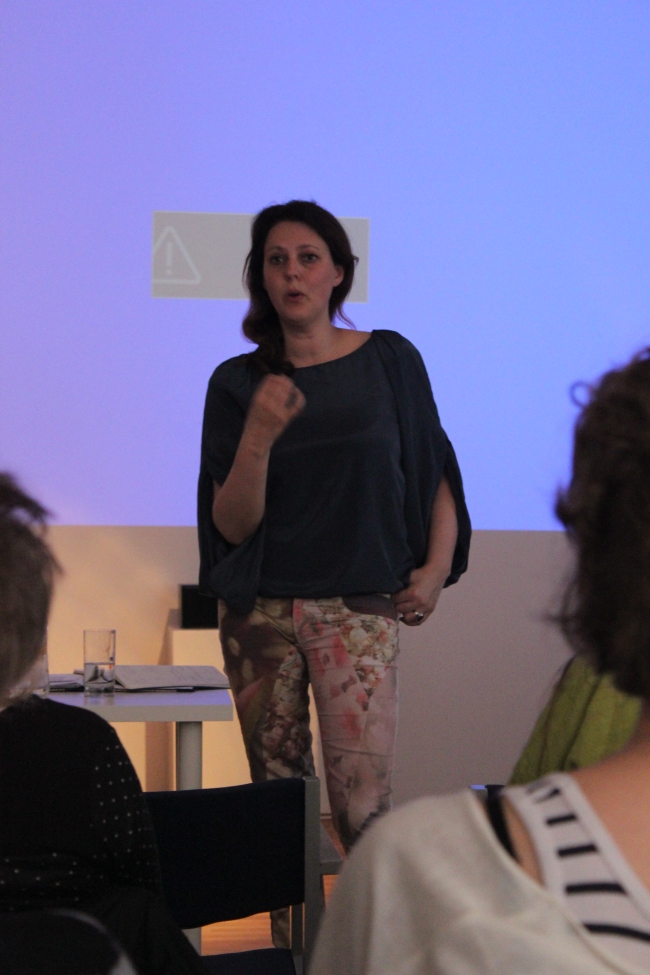At Monbijougatan/Monbijou Street 17e in a building of red bricks in the vicinity of Möllevångstorget/The Mill-Field Square and Folkets Park/The People’s Park an interesting national association has its premises. They are Filmcentrum Syd/The Film Centre South. Filmcentrum is a national association started in 1968 working with distribution of short-movies and documentaries, technique props and guiding. The southern division of this association have their activities here. See http://www.filmcentrum.se or google Filmcentrum Syd. They have courses and education of new film-makers, lectures and other activities such as Filmbar together with Film i Skåne, a window for Scanian short-films four times a year. Part of Filmcentrum Syd is also ARF The Anti-Racist Film Days. Filmcentrum Syd also supports and co-operates with Folkets Bio, Auto Images, Film i Skåne and Boost Hbg.
When I came to their premises yesterday evening they were visited by the Norwegian film director Margreth Olin Myklöen. She was born on April 16th 1970 in Stranda, Western Norway and after studies at the University of Bergen and Högskulen i Volda she became a professional film-maker. Margreth Olin began with telling us that there are always key events in a person’s life that will be extra important for us and make us become who we are and trigger our personal development. When she was a young student she had had a Swedish teacher that she looked up to and really liked, a kind of father figure. She also told us about her film about her uncle Reine whom had Down’s Syndrome. He had a warm and loving relationship to Margareth and he always saw her, the entire her in a good way, despite his handicap. The prejudiced ideas of people around them however was the big problem and how he was treated by the Norwegian society. When Margreth had made this film about her uncle and her family she was afraid that they would protest and during the première rise from their seats and leave. During a key scene with Margreth’s mother her mother was sitting in the cinema with her head down. Beside her sat Reine who put his arm around her and simply said: “Relax. It’s only a film”. This film from 1997 was seen by thousands even though some critics didn’t think it suitable to make a film about a man with Down’s Syndrome.
In 1998 Margreth Olin made a documentary called Dei mjuke hendene/The soft hands. It was a film about a group of elderly men and women at a home for senile people. When Margreth showed us some clips from her films I was struck by how beautiful they were. She said that it was important for her to have respect for the people she was depicting, and I believe her. Margreth Olin Myklöen has an approach that make people feel comfortable with her and open up. The movies were made with such dignity for the people shown in them that it was just amazing. Margreth also works with a small crew and excellent photgraphers who really know their profession. In 2002 she made the film Kroppen Min/My Body which became something of a break-through. She has also recieved several awards and prizes both in Norway and internationally. She recieved for instance the Golden Chair at the Short-Film Festival in Grimstad. She also was awarded Best Foreign Language Film at the 83d Academy Awards and in 2010 the Amnesty International Norway Award.
In 2004 Olin Myklöen made Ungdommens Råskap/Raw Youth which was seen by 60 000 people in Norway. Two years later she released an action movie called Nestekjärlighet.no/Love of Neighbour.no, and then in 2009 she relased her fiction story called Engelen/Angel, in which she describes the destiny of a young woman, from her infancy to her days as a young adult. She showed us some clips and told us about the amount of viewers.
Margreth Olin Myklöen is very much concerned about human dignity and human rights. She has in her documentaries shown us not only her uncle with Down’s Syndrome, elderly senile people with dignity, but also a young woman who was a drug-addict and sold her body, as well as refugees without papers. She has been abroad and met law-officers and smugglers of humans, she has met and interviewed a young man who later from frustration took his own life by hanging himself from the ceiling. Her dedication for telling us stories that are important for our human value has made her an important voice in Norway whom also the Norwegian Parliament listens to. Now she’s making a new documentary about refugees without papers.
It was interesting listening to her and hear her telling us of the importance of having respect for people we meet and for our human kind. We who sat there yesterday were moved by what we saw and heard, even if we only saw short sections of her films. All in all an important lesson to consider for our present and future lives. We learn and develop as long as we live.
Anders Moberg, May 16th 2013

